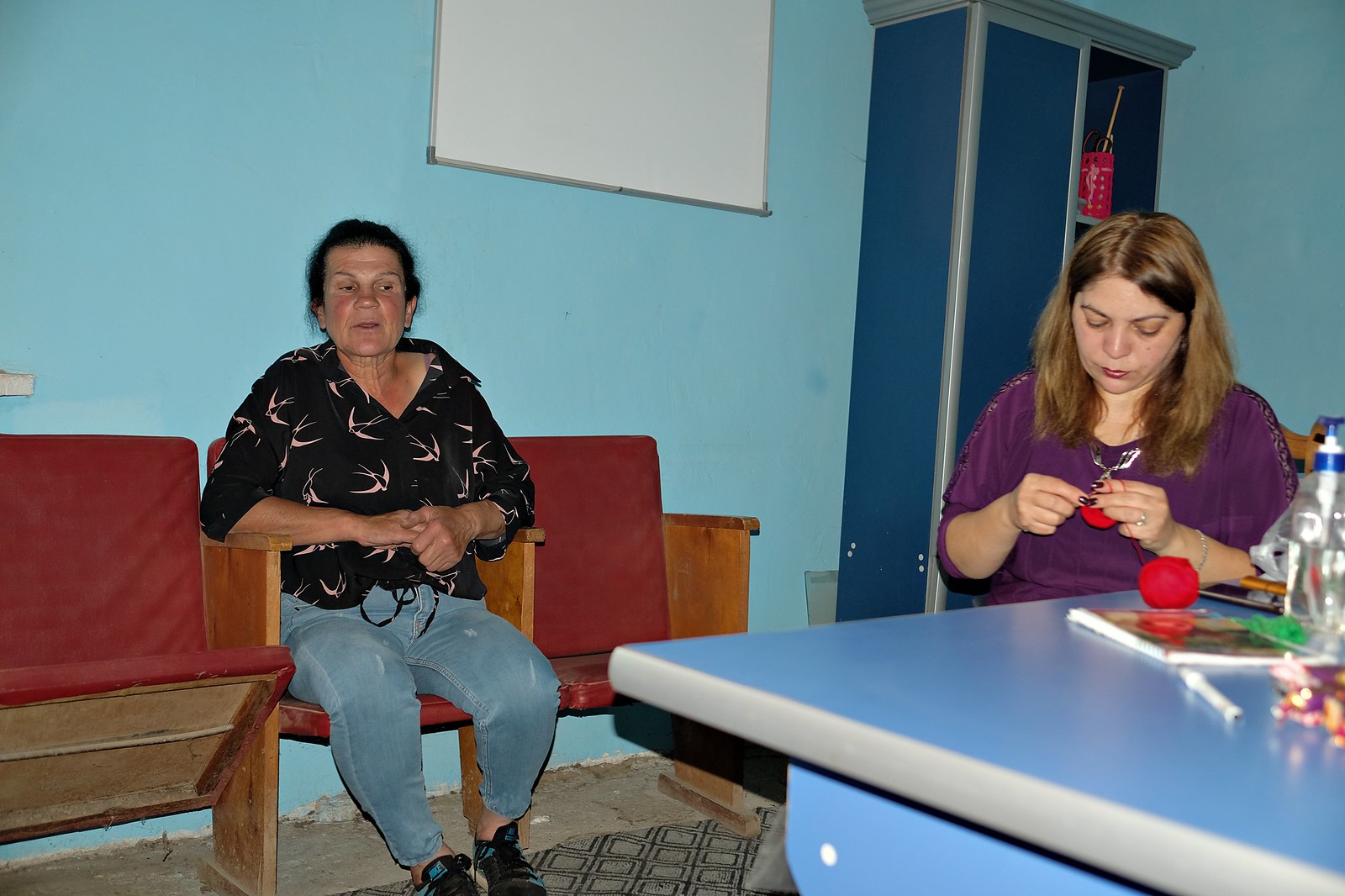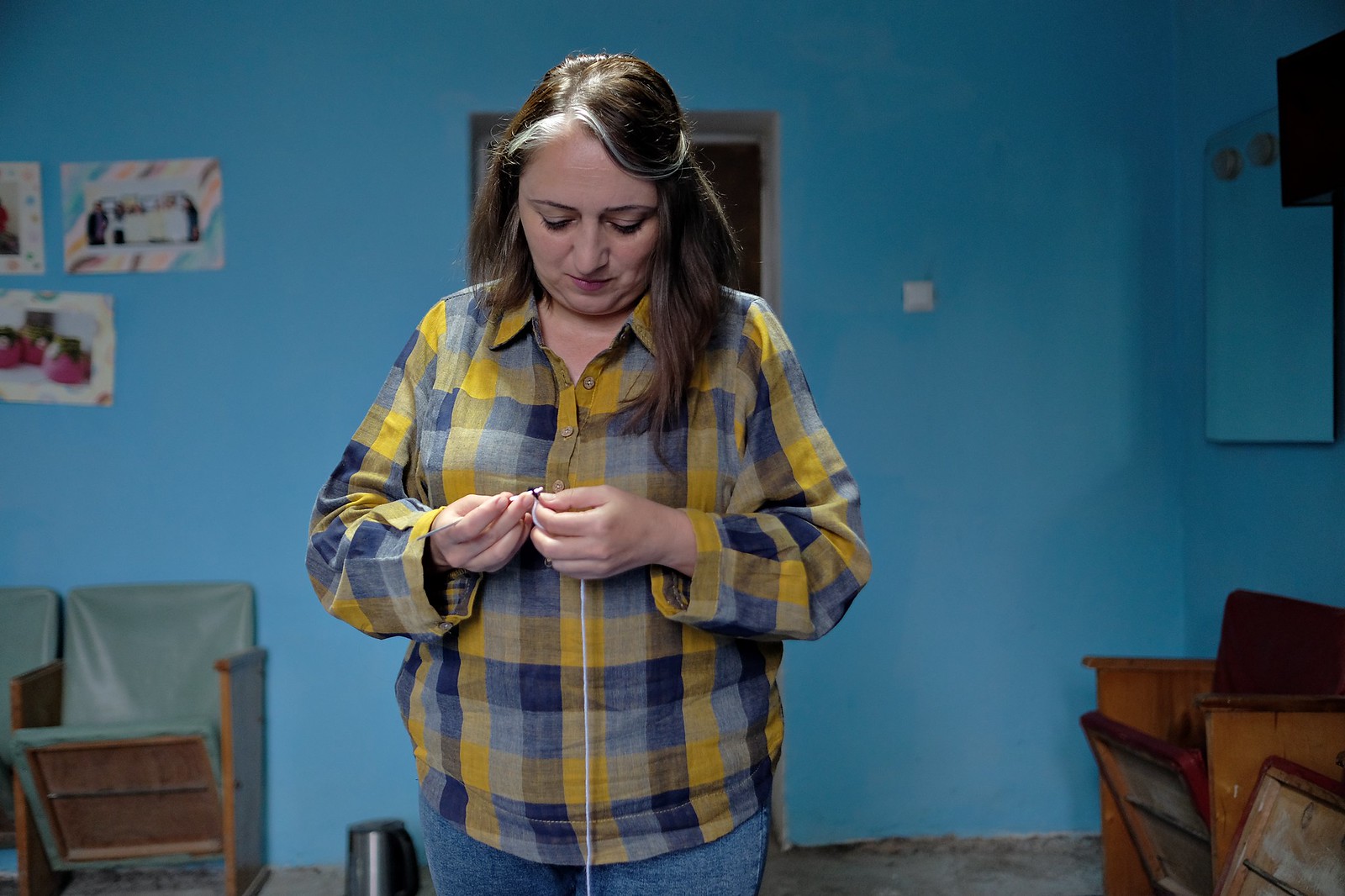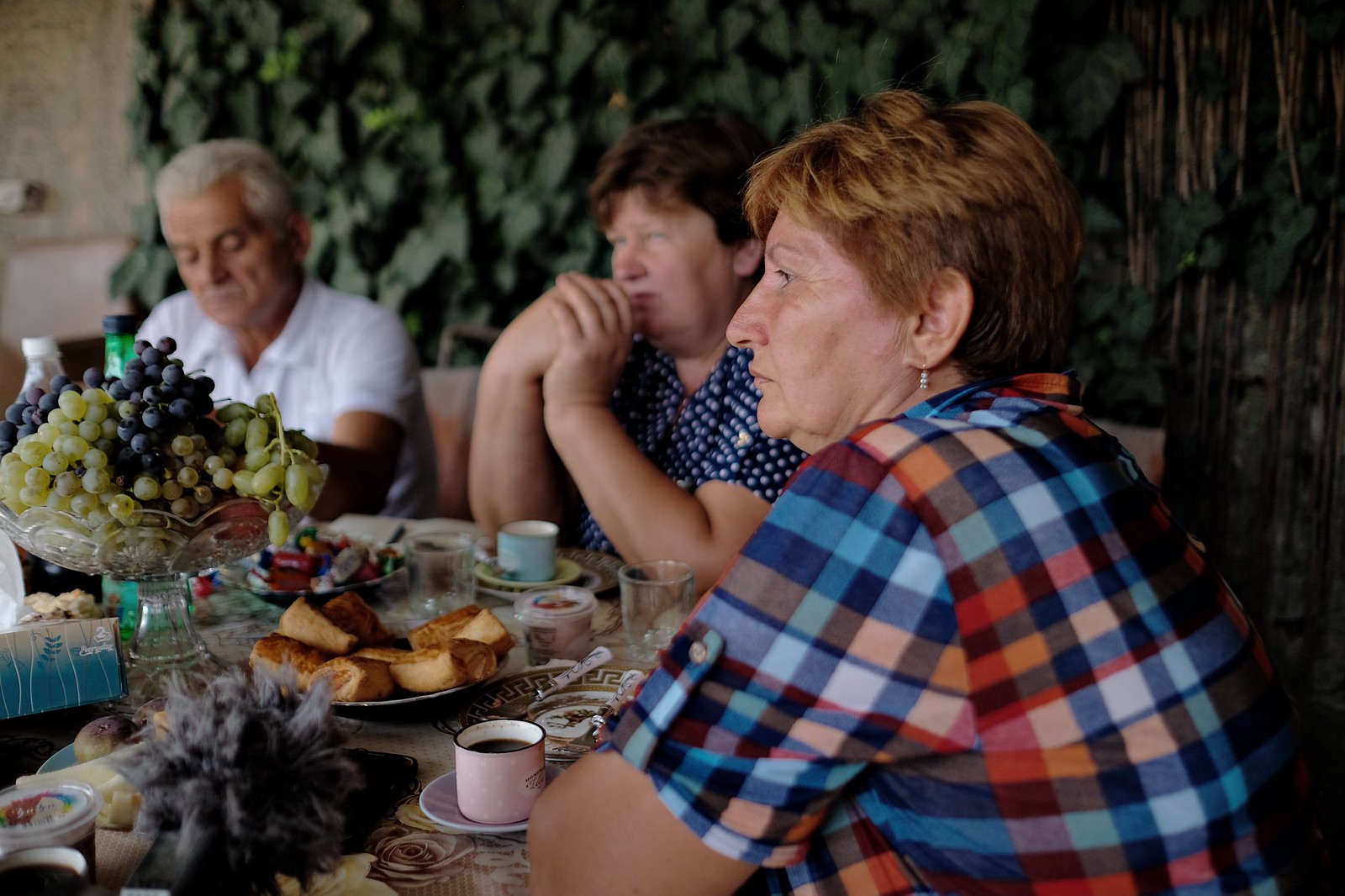“Get ready, we are going to the real Armenia. Soon, you will hear the authentic Armenian language”. This is how our driver prepared me and my colleague for a 5 hour ride from hot and traffic-stuck Yerevan to Berd, abutting the border with Azerbaijan.
After the July clashes with Azerbaijan, Berd became the centre of attention of the Armenian government. In August, 2020, an excavation started in the Clik Amram fortress in the centre of Berd. These mediaeval ruins were to become a big tourist attraction. On September 13, Berd’s Soran park hosted a jazz festival, so that this border community could hear not only the gun-fires from skirmishes, but also high-brow music – jazz.
On September 27, the same park was to host the biggest event of the town, the Honey and Berry annual festival. When the invited officials didn’t show up, the farmers at the park realised; something big had started; not a skirmish, but a large-scale war.
After the 44-day war, Berd was no longer a priority. Our hostess Anahit said that tourists don’t come to Berd any more. We were her first guests of the year.
Anahit․ — When there was relative peace, a lot of foreigner-volunteers would come here. I personally hosted 4 volunteers, one was a teacher of English. But now, after the war, volunteers are afraid to come to Berd. With them, I had a job – i would cook for them, they would finance me, it was not bad.
The most famous berry in Berd is the wild blueberry. Berdians call it “mlmla”. There are numerous legends about how the blueberry was first discovered. One story has it that an American introduced it to Berdians. According to another version, a Ukrainian discovered the berry, gathered it but didn’t manage to find a market for it. The truth is hard to retrieve. One thing is certain- two sisters started gathering it from Miapor mountain. They learned the art of gathering by doing, and persuaded other women to join their business, Because blueberries are hard to gather, the market price of it is very high.
Wild Blueberry is a unique berry, it is very small and grows on the top of the mountain. It’s hard to gather it, but people do it. Because it’s good for the heart and for health in general. At first my sister and I were gathering it to sell. They started the business. Then persuaded other women to join, taught them how to gather, and where to find the bushes.
In the evening we went to the Soran diner. It’s a soviet modernist round building that was planned to become a rope line hub, connecting the city centre to the mountaintop, where the City Museum is. The rope line didn’t get built, so the place was turned into a diner. The restaurant’s name derives from the Armenian word for ooze. The winds do ooze from here to downtown. In Soran we were served rabbit meat. It’s widely used here; Berdians say it’s very good for you. In the dark of the night, we would see the city, and hear the augmenting whistle of the jackals. Later on, the night songs of the military battalion nearby joined in the white noise.
The main job in Berd has always been the military base. After the recent war, the base has been reforming and a lot of contractors, mostly women, are fired, and offered a substitute job in the kitchen.
Aspram․ — I won’t deny it. I made a contract with the army because of my high salary. Because I knew I had to earn money to provide for the education of my daughter. However, I took the service very seriously. I am sure my camandorship was not dissatisfied with me. Otherwise I would receive at last one notice. Now I work in the kitchen of the army. But I’m going to look for another job. Because in the kitchen it’s very hard. As a lot of people do in our region, I have bank loans. I have to have a job, which will allow me to pay for both the loan and for life expenses.
Others leave the military base voluntarily. Those are mostly men who have been to the war. They are shocked, sad and want to find a new occupation and forget the horrors of the war.
Aspram․ — When we were fired, I got a strange feeling of relief, too. I was not any more on needles, when you are a contractor, they might call you and you need to appear when there is an emergency declared. You can’t leave the region when you are a contractor. You need to ask for permission to leave the area. But then again, you become an army personality, doesn’t matter if you are a woman.
Berdians say that being a militarised town has affected urban life.
Anahit Badalyan․ — The research has shown that 7 out of 10 women have functional disruption of thyroid gland. This is explained by lyme quantity in the water in this region, as well as with high stress. Too much continuous stress. Being a border community we were always on the border of war. Most stressed are the wives of contractors. They very seldom even look for job in a new community, because they always change the living space, once their husbands are sent to new locations.
It’s usual for berdians to see humans, men and women, in military uniform walking in town. It’s normal. People know even if nothing is available, one can always get a contract with the army, and the post will be secured and the person will have stable income and keep his family.
The presence of the military affects life, there is money circulating, people earn, and they buy stuff from stores. So it affects business, too. There are also positive sides like that.
Lusik․ — The presence of the military gives us a feeling of security. At the same time, when militaries go around, there is a certain panic, too. So it’s contradictory.
In 2011 a women’s resource centre was founded in Berd, to help women raise their skills and find jobs, to be more economically independent from their men. Recently the Center has been renamed “Bears and Berries” and focuses on jam and mountain honey production, and knitting of teddy-bears for sale in an attempt to create sustainable jobs for women.
Founder of the centre, Anahit Badalian thinks that the other problems such as gender based violence, are linked to women being economically dependent on men.
Anahit Badalyan․ — The region is isolated. The migration flows have been very high since the 2000s. The household work was largely on the shoulders of women. We were raising the competencies of women, and helped them find jobs. In the past, there were a lot of factories. In the Soviet times, having female headmasters was something encouraged. Everything became more dire and gloomy after the collapse of the Soviet Union and the post-war period. The women lost their role outside of home, they had to take care of the household. The violences happened because of this unequal division of roles.
When we visited the centre, a dozen of women were there knitting. They said it tranquilises their soul. Although this knitting business doesn’t pay off all the family expenses. But still this is better than nothing.
Anahit․ — Berdian women are very strong, and courageous, they don’t shy away from any work; they even reap the harvest. Anahit thinks that gender roles have changed. Now women feel more responsibility to take care of the family, while men feel entitled to rely on their young offspring to worry about the money. Men are often lazy, and they find an excuse for idleness.
There is the usual nostalgie for the Soviet past. Back then everyone had a job in the Relay Factory, and went to the market in Tovuz, in Azerbaijan to shop. WIth the Nagorno-Karabakh conflict the travel to Azerbaijan is impossible, And the Relay factory building is occupied by a private glove making factory, called Tavush Textile. The locals call the factory simply “glove”. Its a long rectangular building, with a glass facade. That is the only building that shines 24/7 with a white light. The factory workers work overnight. with two shifts a day. About 300 people are employed in it, mostly women.
Besides the town of Berd, Tavoush textile has branches in three adjacent villages called Choratan, Artsvaberd, Movses. Berdians say a new branch will be opened also in the forth town, called Paravakar. Most likely the Berd office will relocate there. The thing investors are exempt from taxes, if they operate in the villages bordering Azerbaijan.
The working day in Tavoush textile lasts 12 hour, with 20 minute breaks. Two days a week one has to work an overnight shift. The pay is about 80 thousand drams which is about 160 dollars. Even the fact that the company is exempt from income tax doesnt get the employees a better working condition or pay. Anyway, the locals didn’t want to complain a lot. They are trying to sound grateful. As this is the sole big factory in the area. Were there any alternative jobs in Berd, the locals would have an option.
There is very little coverage about Tavoush Textile in the media. There is one notice that the company once violated the security standards and one statement that the owner of the factory has received a medal from Serzh Sarkissyan, the overthrown president of Armenia.
We also travelled to Chinari, a border village one hour drive from Berd. This village has the longest border with Azerbaijan. The community is in effect a peninsula in Azerbaijan.
The mayor Samvel Saghoyan has preserved the poster of the last 5 year plan of kolkhoz and the Statue of bolshevik Stepan Shahumyan. He thinks Shahumyan as a “Great Armenian” never mind his communist views.
Saghoyan isn’t happy that the textile industries wanna move to his rural community. He says that villagers should tender the garden, and sewing machines belong to cities. If the women work on the sewing machines, what do I do with the soil? The soil becomes a desert.
Saghoyan had an idea to create a women-run cooperative, to produce tomato stems. Geghetsik and Olya are co-founders of the greenhouse of tomatoes. We met them in their yard and were served their figs from their garden. “The cooperative takes a lot of labor, but it is not overwhelming. You can also manage to find time to tender the trees and run other household errands. While the sewing machines had to run 12 hour non-stop. It would leave me no time to do my garden maintenance “,- says Olya.
On the ride back to Berd, our driver Rob told us about the community problems. He said the villages here grow old, meaning the youth leaves for cities in search of more active life.
Robert says, he doesn’t blame the youth. He has children himself and doesn’t see a promising future for them here. Leaving behind the Shahumyan statue and the five-year plan, we drive through forests and gorges, along a shallow river. The road makes zig-zags, and at one corner, Rob says, this U-turn is called the Stalin turn, because this is where the villagers disposed of the Stalin Statue in the 1990s, when Armenia became an independent republic
Ani Tadevosyan, Knar Khudoyan
Photos by Eliza Mkhitaryan
The report is the third part of the “Borderland Stories” series. The first was “Escape to Nature“, the second “The room of Anger“.
 Epress.am News from Armenia
Epress.am News from Armenia









